Conversation Piece:
WILLIAM WARFIELD
(A Celebration of his 70th Birthday)
By Bruce Duffie
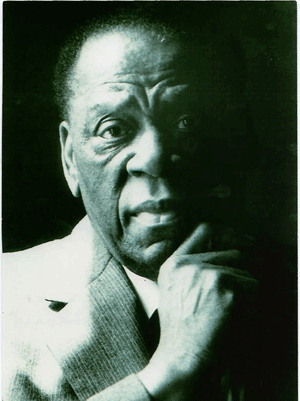
Conversation Piece:
WILLIAM WARFIELD
(A Celebration of his 70th Birthday)
By Bruce Duffie

Incredible as it sounds, the distinguished bass and teacher William Warfield turned 70 years old this January. Still performing narrative parts with major orchestras, he has been sharing his experience and insight with students at the University of Illinois for over 15 years. In addition to his other credits, Warfield will probably be remembered most for his portrayal of Porgy in Gershwin's opera both onstage and in the recording. Other discs that have carried his artistry around the world include the "Old American Songs" and "Lincoln Portrait" both by Copland. Warfield was also married to soprano Leontyne Price for 20 years, and they remain close friends to this day.
Keeping close ties to Chicago - including an advisory position with
Lyric Opera - it was my great pleasure to chat with William Warfield on
one of his visits to the Windy City. His presence was wise and
generous,
with an understated elegance that comes from having achieved so much at
a time when any kind of career was unnecessarily hindered. He
acknowledges
the pioneering efforts of those who went before, yet seems unimpressed
by the fact that he decisively helped to make possible the careers of a
generation of black artists.
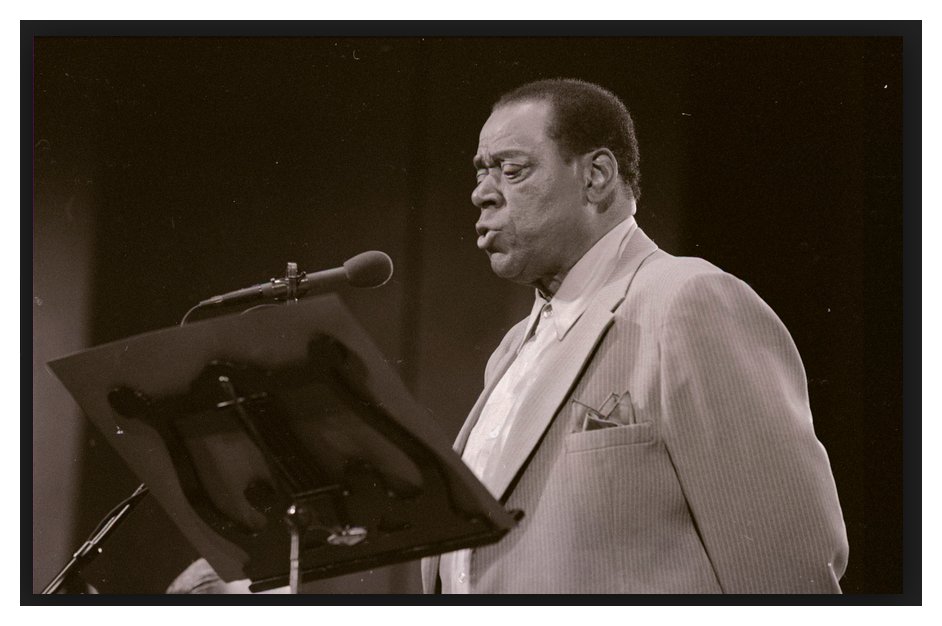
With best wishes at 70 and hopes for even more from his imagination,
here is much of what we talked about that afternoon. . . . .
Bruce Duffie: Besides your illustrious careers as singer and teacher, you also judge vocal competitions. What do you look for in a young voice?
William Warfield: When I'm listening to a young voice, I'm listening to what the basic instrument is and how I feel that instrument will meet the competition that is out there. These days, when opera seems to be the big thing, I look for a sizable sound (though not necessarily a huge one), something that you could put on the stage at Lyric Opera of Chicago and be able to hear with an orchestra playing against it.
BD: Is it reasonable to expect a voice to fill a house that has nearly 4000 seats?
WW: Yes, if the acoustics are good. If you sing correctly and
the conductor keeps the orchestra at a level that you can be heard,
there
is no reason why it shouldn't fill a large auditorium. The voices you
hear
all the time at the big opera houses are not huge sounds. They are
sizable,
but the idea is that they should have a projection. If the voice is
produced
correctly you can project it very well. Lily Pons [career from
the
early 1930's to the late 1950's] with her high coloratura soprano just
rose right above the orchestra and you could hear her very well.
Conductors
have to be aware of this, and the scoring for a light coloratura will
not
be as heavy as that for a heroic Wagnerian soprano like Birgit
Nilsson. [See my Interview with Birgit
Nilsson.]
BD: As you listen to the competitions and as you teach your own students, are you hearing these kinds of voices coming along?
WW: Oh yes, there are many of them coming along. You look not only for the voice itself, but the approach, and whether they are into that "fach" or some other category - it could be German, French, or Italian. If they're singing Verdi, you look for certain things that they would have in order to do those roles. A Verdi Bass, for example, would have a bit higher sound, more of a baritone with a good bottom, but very lyric rather than, say, a Mozart bass like Sarastro which has just a heavy sound way down low.
BD: So the voice you have imposes the repertoire you will sing?
WW: Yes, very much so. We hear all the time about people singing literature that is too heavy for them. But when a singer is young, you have to listen with an idea to whether the voice will develop one way or another, and that is difficult. At 20 or 25, a singer will not have the same sound as when he's 30 or 33. So, when we work with singers and judge them in competition, you have to take that into consideration. Potential is important especially with the big, dramatic voices. You will see the seeds of where a voice is going, but he won't have the power that will develop, or if he does, it's most unusual.
BD: Then is it the teacher's job to make sure the voice is focused in the right direction and developed in the right way?
WW: That's the whole idea. That's the teacher's job. We don't have the finished product with youngsters in college. We have the direction in which they're going, and the teacher has to be wise enough to guide them in that direction so along with learning how to use what they have, it's developed in the direction to get bigger and better. It's dangerous for teachers to deal with youngsters like that. You have to continually keep them from doing things that they're too young to do so that they don't overshoot themselves. I often let singers in my studio work on music that they will grow into, but by no means do I let them sing it yet. I let them become acquainted with it, and the voice develops as it goes along. But professional singers do the same thing all during their careers. We will often work on a role for years before ever thinking about giving a performance. You have to prepare it so that eventually everything - body, attitude, voice - is ready for that role. Pacing a career is very important.
* * * * *
BD: In your own career, how did you decide which roles you would accept and which you would delay or even decline completely?
WW: Actually, I didn't have that particular problem so much because I wasn't fully into opera as such. If you're into opera, you have to be guided by what roles you are going to do. When I was a youngster, blacks had no access to opera at all. The concert field was open, and you went in that direction. Roland Hayes was the first black man that got recognition as a concert artist, and, of course, Paul Robeson. The consummate concert artist was Marion Anderson. So I didn't have to decide about roles. I did arias, and I selected them according to my range and how well I thought could do it.
BD: I want to come back to your career in a moment, but I want to ask about the racial problem. Is it basically a thing of the past?
WW: Basically, yes. A youngster who is black can now really
look
forward to having a chance to be in opera. Whether it's completely open
in every role of both sexes can be argued. You remember, when Simon
Estes
got to the Met, his one statement was that he felt that he should have
been there two or three years before. That barrier for the black male
still
existed. Even today, the tenors who are the romantic lovers still find
a little resistance. But we have made strides.
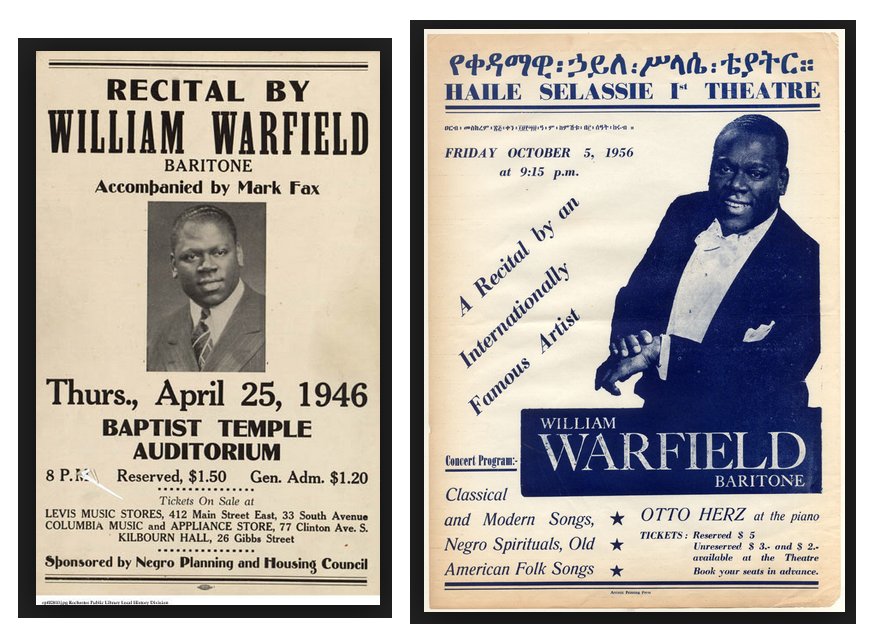
BD: Now coming back to your own career. . .
WW: When I was younger, I did a lot of baritone arias such as “Eri tu” (from The Masked Ball by Verdi) with the high G. But when I hit 30 and my voice settled into a bass-baritone range, those were increasingly difficult. In the stride of my career, I did bass-baritone literature such as "Ella giammai m'amo" (from Don Carlo) and other Verdi bass arias. I never did the lowest bass parts. It had to do with the sound. As I got a bit older, the arias from Boris Godounov (by Mussorgsky) fitted me like a glove. It's a settled sound that resonates lower than what a high baritone sounds like. So it just happened naturally and I went with what felt most comfortable in my voice. If I had been into opera, it would have been a big problem for me in the same way it's difficult for a high mezzo who has to decide whether to be a mezzo or a soprano. A good mezzo should be able to sing a high C, but that doesn't mean she's a soprano as such. That can be a trap, and without mentioning names, there are many mezzos who have jumped up to soprano and later jumped back down because the high tessitura was a little to hard to maintain.
BD: What is it that is fascinating about a higher role?
WW: From the viewpoint of the singer, it's probably something as simple as the public glorifying high notes. You can stand there and sing up a storm, and a soprano enters and sings a high C and the audience is gone. What baritone wants to follow the tenor who bats out all those high C's in the Daughter of the Regiment? It's a little less urgent for males. A baritone with a good A-flat or A is content and doesn't want to tackle the high C. But most mezzos can sing their high C, and the soprano grass looks greener than the mezzo grass. Perhaps the fact that since some mezzos have not been successful in the soprano range has cautioned other mezzos. They can do the high C, but they don't want to have to do it all the time. There is a delight in getting a high note and letting it soar.
BD: How much of all this is artistry, and how much is vocal gymnastics?
WW: I think what we're talking about here is gymnastics. It's not a particularly artistic approach, just the sheer ability to sing notes and issue sound. The artistry comes in when all of that is there and you use it to create a scene or a feeling, and you don’t have to worry about whether the voice is able to do it. For that reason, the prime consideration is comfort, and can you do what you feel it should be from an artistic standpoint. You discard having to worry about whether the note is going to come out.
BD: Having studied dramatics, could you bring more conviction to the arias you did in concert?
WW: I’m not sure. Certainly I did a great deal. Back in those days, the line was pretty defined. Either you were a concert singer or you were an opera singer. By the same token, if you asked an opera singer to stand on a platform and do Schubert or Brahms, it could be pretty pathetic. It's the conception that brings the drama into a much smaller perspective. I can create a whole scene in two measures of Schubert, whereas the whole operatic thing is much broader. Even the sound or the quality is different. Peter Hermann Adler was one of my advisors, and he'd listen to me do some lieder and then an aria, and he would tell me I had too many colors. He wanted me to discard all those shades and get one "operatic sound", and that was very difficult for me. So when things started opening a bit in opera, they urged me to go that direction and I resisted. I'd have had to discard everything I'd done until then and probably go to Italy and immerse myself in the sound. I was doing very well and enjoying myself in oratorio and appearances with symphonies, so I never really made the transition. I might have been able to do it if that was all I had to do, but not while continuing with the original direction.
BD: One of your great roles was Porgy.
WW: Yes, but the difference between doing Porgy and doing
Boris
is a matter of conception and coloring you have with the voice. That's
due to Gershwin. What he did was to go to Charleston and have people
sing
for him. He tried to put down on paper what he heard and associated
with
the black voice, and what and how they sang. I had come up in that
tradition,
so I didn't have to do anything vocally to fit. It already fit and was
geared for me.
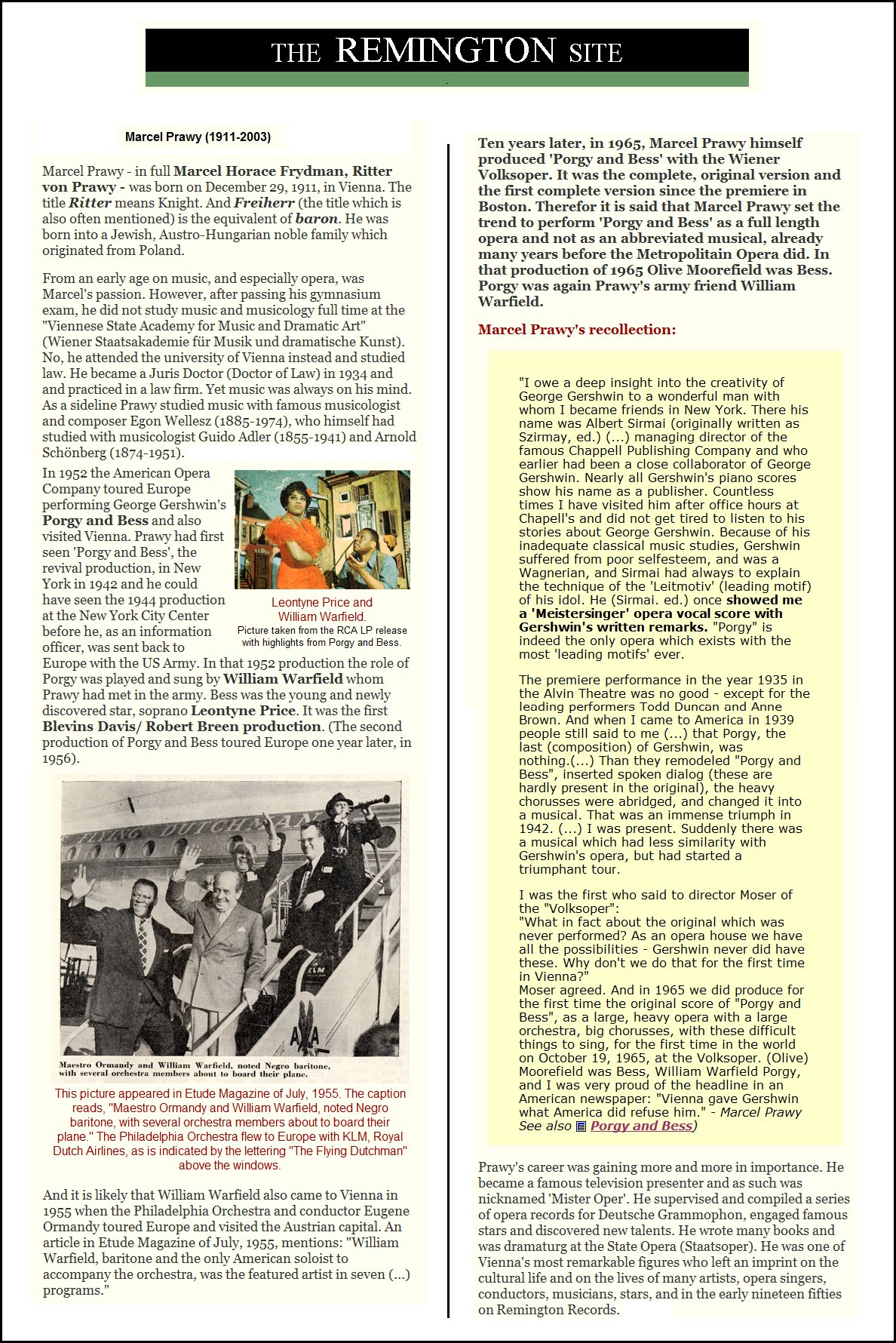
BD: Could a white man sing Porgy?
WW: I think so, but it would have to be the same kind of
thing
we've been talking about. He'd have to have a tremendous amount of
experience
and be familiar with the black sound and how they do melismas. If he
brought
to that a good ear and attacked Porgy from that standpoint, there's no
reason he couldn't do it. I teach youngsters of all races in my studio
and I had an instance where a girl sang the Strawberry Call. If you had
shut your eyes, you'd swear it was a black singer, but she was blond
and
blue-eyed. She'd heard a lot of music and spirituals, and as I pointed
out things, her ear picked them up immediately and she was able to
repeat
them. So it became flaccid and open, and the melismas fell into place,
not like she was reading three sixteenth-notes and a quarter. One of my
other students who was at that performance told me I should be ashamed
of myself for teaching her so well! [Laughs]
BD: Now is this artistry?
WW: Yes, but the voice has to be able to do what is required before the nuances can be developed.
* * * * *
BD: How do the voices of today compare with those of yesterday?
WW: They compare very well with those of yesterday. Technically youngsters are very sure of themselves, but there is the advantage today that they are generally sounder musicians. Even when I made my debut in 1950, a lot of the top artists at the Met didn't even read notes! Pinza, for example, didn't read music. But today, you won't find anyone on the scene who can't sight-read, and most will also play piano or some other instrument. So the musical foundation is stronger, and as a result, they are more pliable for the conductor to do the things we've been talking about. They are more dramatic, and it becomes more of a performance of a role, rather than just standing there issuing beautiful sounds. But as we get back to the earlier generations, all we have are the recordings by Caruso and others, and you can't really tell about the magnificence of the voice from them. The technical quality has changed so very much since then.
BD: Is there still an artificiality about recordings?
WW: The very fact that it is a technical method of capturing the voice indicates an artificiality. And when you record a section several times, the final product that is issued may be a combination of all those takes, and that is one of the dangers for those listeners who are so completely versed in recordings. They take that sound in their ear to the live performance, and if the singer doesn't live up to that which was selected and engineered the best, then they are disappointed. But who can duplicate that recorded-sound in the live theater?
BD: Then at what point does the record become a fraud?
WW: In a certain sense, it presents to the listener a thing that has been cleaned up to the point that there are no mistakes, so it is a kind of fraud. A human being cannot produce every note perfectly every time, time after time. But in listening live instead of on record, it might just be even better!
BD: Are you pleased with the recordings you made?
WW: Generally yes. I listen to those I made early on, and one
was the Brahms Four Serious Songs coupled with the Liederkreis
of Schumann. I’ve matured so much since then and I hear so many things
I would do better now, it's like listening to a baby. I'm always asking
myself, "Why didn't I do so-and-so there, or why did I do that there?"
I've matured so that I'm now much more in tune with the texts, which
are
from the scriptures. I also hear in my voice things that have developed
and grown into better things. I wish I had that freshness of voice now
with the understanding I can bring to it. That would be fascinating.
There
are so many things you just grow into as you do it; a matter of
experience
as you live more.
BD: With most of your students going into opera, are we losing the tradition of the lieder recital?
WW: Not necessarily. At most of the big schools, the management of the voice department is separate from the opera department. Our job is to perpetuate the song literature of many countries and traditions. I find that our youngsters are coming out now being able to relate to both opera and song. It's all a part of their training, and that is the wonderful thing that is happening to music and youngsters these days. We require a junior recital and a senior recital, and another for the master's degree, and at least three for a doctorate. That way they are as familiar with Brahms as with Verdi. When I was young, you either did one or the other, either songs or opera. I think it's better now, and one helps the other.
BD: What about contemporary music - is there good music still
being written?
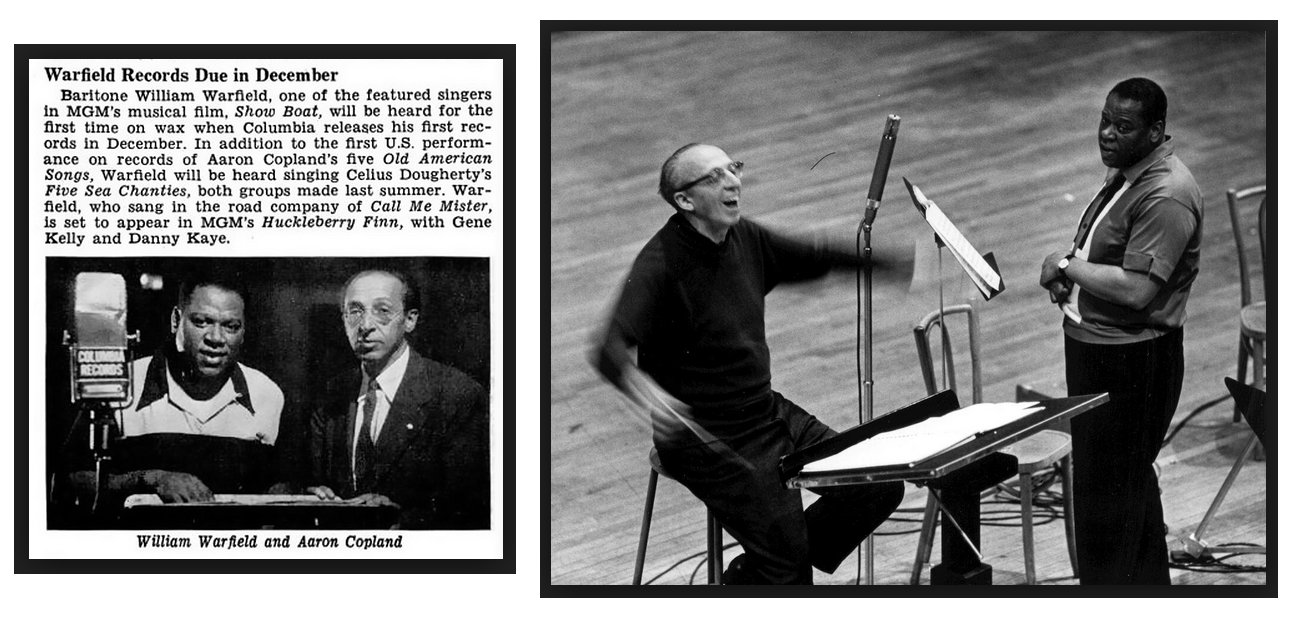
WW: [Hesitating] Yes, and the way I say it is because there
is
good music being written that is very vocal, but we're into a phase now
dealing with electronics and synthesizers, and that demands a great
deal
of attention of the singer. The extended vocal techniques have very
little
to do with a simple singing line, and singers are finding themselves
thrown
into situations where, at the least, they have to be aware of doing
these
kinds of things. In doing them, the things being written in the
traditional
ways are being neglected.
BD: Do you encourage your students to sing some contemporary songs without doing damage to their voices?
WW: Yes, very definitely, but it comes down to what they consider to be damaging. Then you must coerce them away from it, or give them an alternate way of doing it that does not hurt the voice. There is a great deal of controversy, for instance, as to whether a black singer of classical music should do gospel. Gospel demands so much of a raw kind of tone production, and carrying the chest quality right to the top of the range. You can hear that even in some pop singing, and they can't continue that way indefinitely. We've got to explain to the students that they can't just grind it out from the throat, but try to get the blatancy of the sound from the head to get the same effect. [Here, Warfield illustrates by singing a phrase very roughly from the chest, and the same phrase with a head tone that still suggests the rough edge, but with the flavor required of the style.] That's the attack that I use when hoping to steer a student into better vocal habits. My father was a minister, and I used to see him and other ministers do revivals, and the whole thing was to tear the voice apart. They just continued doing it night after night, and I wondered even then when their voices would give out entirely. Although they call the vocal cords the most fragile things in the world, I have also seen them be the strongest things. I could not imagine how these men could do a revival one day and wake up the next day and even speak, much less do it all again, but they did, and do.
BD: Do you encourage your black students to include gospel in their programs?
WW: No, but I do try to get them to include music of black composers and some spirituals. Originally a choral form, spirituals are now arranged for solo, and they've gotten very sophisticated to be almost art songs.
* * * * *
BD: In all of this - opera, art song, spiritual - where should be the balance between the art and the entertainment?
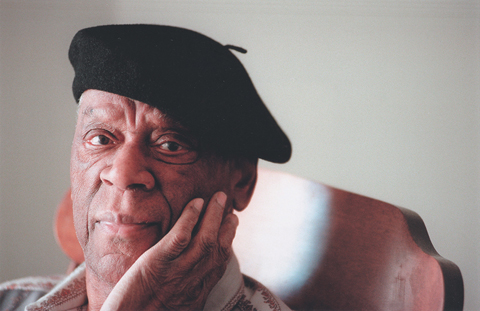 WW:
I think the entertainment is something that happens as a result of the
art being there. It's an extension. If I were singing alone, I would do
certain things and put some artistry into the music, and that doesn't
change
when I step out in front of an audience, although then it is
entertainment
for them. But it has to please and entertain me before it does them.
WW:
I think the entertainment is something that happens as a result of the
art being there. It's an extension. If I were singing alone, I would do
certain things and put some artistry into the music, and that doesn't
change
when I step out in front of an audience, although then it is
entertainment
for them. But it has to please and entertain me before it does them.
BD: What do you expect of the audience that comes to hear you in performance?
WW: Just to receive it. If they meet me half way, we'll have fun.
BD: Is singing fun?
WW: Oh yes. I don't think I would do it if it wasn't fun. We know of musicians who say their father or mother made them learn to play or sing, but singing can be such a natural thing that it's an outpouring of yourself. Whether you want to make that your total productivity of your life and fortune, that's a thing that you have to decide at a certain point. But long before a singer has embarked on any kind of a career, they are totally involved in singing.
BD: Are there some students that you have to gently urge that they find some other kind of career?
WW: At the university, we audition people in advance, and if we don't think that they have a chance to make a career, we don't admit them into the program. There are some who do make it into the school, but decide after a couple of years that it's not for them. Often the students themselves recognize this by comparing what they are doing with what the others are accomplishing. Some then go on to very successful careers in other fields, but a few hang on and on and nobody can tell them they're just not going to make it. That's unfortunate, but it does happen.
BD: We're entering the era of the supertitles in the theater. Is this going to kill opera-in-English?
WW: It just might. When it first started, even the die-hards came back from seeing them and were completely won over. My feeling was it was wonderful. At a glance you can take the whole thing in, and it makes it so much clearer to know exactly what's going on. The audience laughs at all the right places because they comprehend it. When I gave recitals, even when I was starting out, I insisted that there be translations in the program. And, the artist gets the feeling that the audience is on the same level with him. Supertitles might also kill the selling of librettos in the lobby... [Both laugh]
BD: Is opera for everyone?
WW: I think so, and one of the reasons I do is that I've taken youngsters to operas that have been done there in Champaign, and they were really fascinated. I must advise not to take a first-time youngster to a big, heavy opera. Take them to Carmen or certainly Bohème, but not to Die Walküre. The fact that there are so many new opera companies compared with 20 years ago, somebody must be doing the right thing.
BD: Thank you for being a singer.
WW: Thank you for accepting me as a singer. That makes it
wonderful
for me.
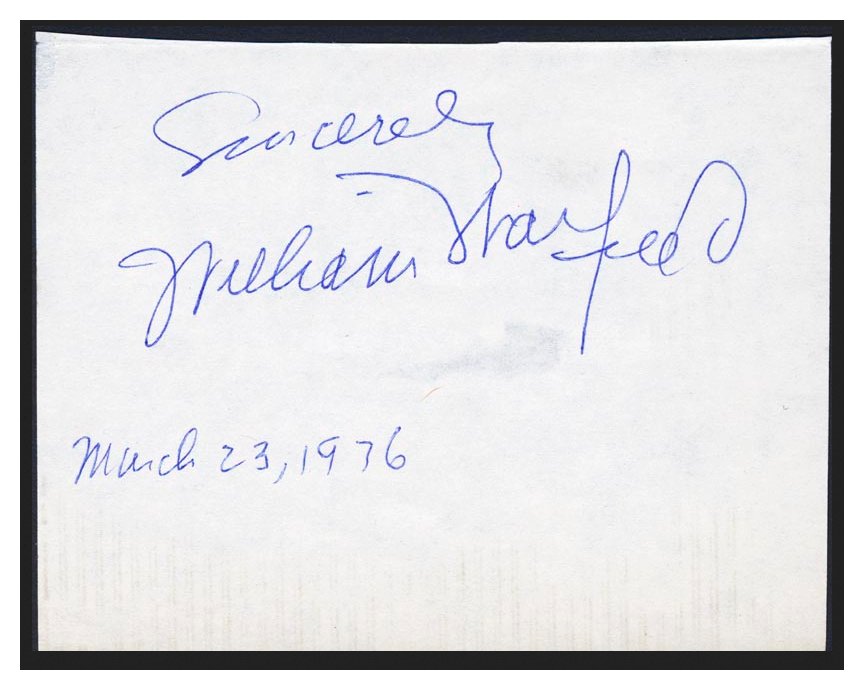
=== === === === ===
--- --- ---
=== === === === ===
For more information about William Warfield and the William Warfield Fund, which was established in 1977, visit this website [http://www.williamwarfield.org/].
© 1988 Bruce Duffie
This conversation was recorded on April 14, 1988 in Chicago, and
portions
were broadcast on WNIB later that year, and again in 1990, 1995 and
2000,
and on WNUR in 2002. A portion was also included in the Memorial
Program at the School of Music of Northwestern University on October 6,
2002. This transcription was made in 1989 and was published in The
Opera Journal in March, 1990. It was then posted on this
website
in January, 2007. More photos and links were added in 2015.
To see a full list (with links) of interviews which have been transcribed and posted on this website, click here.
Award - winning broadcaster Bruce Duffie was with WNIB, Classical 97 in Chicago from 1975 until its final moment as a classical station in February of 2001. His interviews have also appeared in various magazines and journals since 1980, and he now continues his broadcast series on WNUR-FM, as well as on Contemporary Classical Internet Radio.
You are invited to visit his website
for more information about his work, including selected transcripts of
other interviews, plus a full list of his guests. He would also
like
to call your attention to the photos and information about his
grandfather, who was a pioneer in the automotive field more than a
century ago. You may also send him E-Mail
with comments, questions and suggestions.